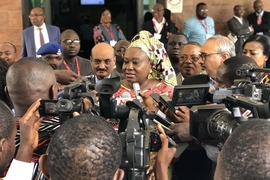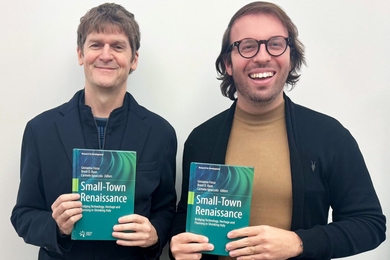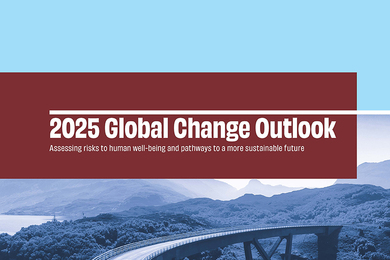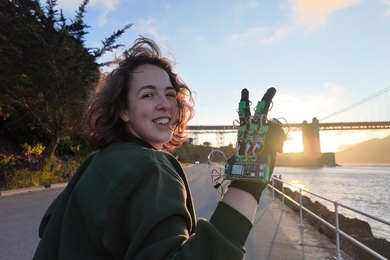It’s been a banner year for Nigerian journalist Shola Lawal. The young reporter, who focuses on human rights and social justice issues, was selected as the 2019 International Women’s Media Foundation’s Elizabeth Neuffer Fellow. The fellowship brought her to MIT this fall as a research associate at the Center for International Studies and provides further journalistic training at The Boston Globe and The New York Times. Last month, she got news from back home that she received The Future Awards Africa Prize for Journalism for making significant contributions toward that continent’s future. Finally, she is set to release her first long-form documentary. The film, “Where Powers Live,” chronicles the lives of marginalized indigenous religious worshippers in Nigeria and will be screened on campus next month.
Lawal began her career as a freelance correspondent upon graduating from the University of Lagos. She has covered such topics as women’s rights movements in Nigeria, migrants in Libya, forest reserves in Ghana, and political upheaval in Togo. During this fellowship, she is focusing on issues of injustice that sit at the intersection of certain U.S. policies.
She sat down to discuss what it is like to work as a journalist in Nigeria, her reportage last spring on Boko Haram, and her recent trip to Mexico to investigate the migrant crisis.
Q: The Nigerian government is notorious for putting limits on press freedom, including detaining journalists and activists. How does this impact your work?
A: Compared to dictatorships on the continent, Nigeria has been fairly navigable for me as a journalist. There have always been stumbling blocks with institutional corruption, secrecy, and insecurity, but journalists have been able to pull through. This is not to say journalists are not killed or targeted. We’ve always been. However, it has been a particularly hard time for us under President Muhammadu Buhari. He was a former military dictator who got recently re-elected. Fears that dictatorial tendencies would emerge even as a democratically elected official are being realized now. This year alone, there have been raids on newsrooms by the military and persistent persecution of journalists. Critics of the government have disappeared without a trace and, as we speak, a media entrepreneur is in detention indefinitely for protesting against the government.
Worse, parliament is pushing a social media bill that will criminalize insulting government officials with a jail term. The presidency seemed ready to sign off on it, with First Lady Aisha Buhari publicly citing China as an example of a country that "successfully controls" social media. Public outrage forced parliament to drop it temporarily, but it is still disheartening to know that this is being seriously discussed in the first place. Policies like these negatively impact on journalists and citizens in an age where digital and social media have become crucial tools for bearing witness and exposing injustice.
There is a grand strategy of fear at play here, and to be frank, it is, for the most part, effective. It’s hard not to self-censor when you know you can be kidnapped or detained and that you’ll only become another statistic. It’s hard not to be scared when you see educated parliamentarians pushing such a regressive policy. I’m scared of what this means for myself and my colleagues, truly. But I’m undaunted. I continue to work even with that stomach-churning fear, and so do my colleagues. That gives me hope.
Q: The founder of Boko Haram, Mohammed Yusuf, died in police detention 10 years ago this past October. His death led to the radicalization of the sect and it becoming a jihadist terrorist organiziation. You reported from the heart of the crisis just last spring. Is there any end in sight?
A: The end is not nearly in sight, I’m afraid. While things have been quiet on the international front regarding Boko Haram coverage, the reality on the ground is that the group continues to control pockets of territory in northeast Nigeria. A different faction, backed by ISIS, has emerged and calls itself the Islamic State’s West Africa Province, ISWAP. Although ISIS was defeated in Syria and Iraq, it seems to have settled in Africa. The group supports networks of militia groups now operating in West Africa.
Across the region, we’ve seen an uptick in insurgency movements. They have similar strategies of guerrilla attacks and suicide bombings, and they kidnap people for funds. These groups operate in the West African Sahel region, a zone that is vulnerable to climatic changes, causing even more pressure on communities there. Several countries, including Nigeria, Niger, Burkina Faso, and Mali, have been especially affected.
In Nigeria, Boko Haram’s influence has shrunk, but we will reckon with the consequences of the group’s terror for generations. Millions are displaced, languishing in camps where resources are inadequate. Many are missing. In Borno, where the insurgency started, I spoke to mothers who have not seen their sons in 10 years. The military has rounded up hundreds of young men that are suspected of terrorism without trial. Their families don’t know if they are alive or dead. Trust has been destroyed: trust in government, but even trust within communities. For a society that is big on social connections, that says a lot. For example, teenagers rescued from Boko Haram enclaves are finding it difficult to re-integrate in their communities because community members see them as insurgents, too. I know we will heal as a nation, but it will take a long time.
Q: You recently wrote an opinion piece for The Boston Globe on the Trump administration’s asylum ban. You described it as targeting Central American migration and that it will have a devastating impact on people who are fleeing conflict in African countries. You recently returned from a reporting trip to Mexico’s southern border. What did you learn?
A: It’s very easy to focus on the U.S.-Mexico border with the administration’s emphasis on ‘the wall’, but a lot is happening on Mexico’s southern border. I was surprised to see not just Africans, but also Asians and migrants from the Caribbean in their thousands. They are all trapped by U.S. restrictions in Tapachula, a border city with Guatemala. Mexico is cracking down on transiting migrants, containing them in its poorest region to avoid trade sanctions from the U.S. There’s no aid provided to these people, so many are living in tents. Locals are nervous about the burden of housing all these people on already-inadequate infrastructure. I think it’s only a matter of time before they lash out.
For context, thousands of Africans have traveled from countries like Cameroon and the Democratic Republic of the Congo, both countries in conflict. They fly to South America and walk or bus north to get to the U.S.-Mexico border. People from Haiti have done the same. It’s a difficult journey. They must pass through the Darien Gap, a jungle between Columbia and Panama where wild animals, flash floods, and armed men have taken souls that we cannot account for.
Now, they are caught between a wall and a hard place. Living conditions in shelters are miserly. People are sleeping in tents on the streets and surviving on donations. Women are presenting with reproductive diseases and children with skin infections. I saw a woman cradle a 5-day-old baby who had not received proper medical attention. She looked so desolate, so helpless. It’s an emergency, to put it plainly. And we must all work, in any capacity we can, to call attention to it so that these policies are reversed and these people can be free.









